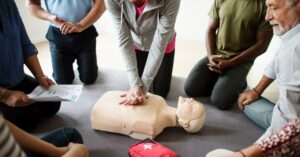Starting in a neonatal unit or considering a neonatal nursing career can be both exciting and daunting. Yet, neonatal nurses play a vital role in the health and development of the tiniest patients in our healthcare system. The most essential thing to do in your career is to grow. Here are five helpful learning tips for neonatal nurses wanting to excel in this highly specialized field.
1. Mastering Neonatal Resuscitation
Neonatal resuscitation is a primary skill newborn nurses should feel confident about. At the heart of this technique is understanding the ABC approach (Airway, Breathing, Circulation) in newborn emergencies. Start with the bag-mask device, the most common piece of resuscitation equipment. Take the time to learn the appropriate pressures to use and how to position it over the baby’s airway. Then, move on to the nuances of endotracheal intubation and chest compressions for babies. Practice, debrief, and revise often to build your reflexes for these high-stress, critical moments.
2. Developing a Keen Eye for Neonatal Body Language
Neonates cannot verbalize discomfort, so they rely on their nurses to observe and interpret their body language. Familiarize yourself with observing subtle cues, like eye movements, facial expressions, and changes in skin color. Work on differentiating between normal reflexes, such as the Moro reflex, and signs that the baby is in distress. Continuous observation will help you understand how to respond to neonatal needs.
3. Staying Up-to-Date With Neonatal Pharmacology
Pharmacology forms a significant part of a neonatal nurse’s toolkit. With premature and underdeveloped newborns, medication application is an art. Ensure you are current with the dosing, administration, and potential complications. Regularly review the neonatal formulary in your unit and continue your education by learning new drugs or dosing protocols. Understanding each medication’s implications and pharmacodynamics in the neonatal context is imperative.
4. Nurturing Effective Communication With Neonatal Families
The neonatal environment can be extremely stressful for families. Effective communication is key in establishing rapport and support for these parents. Learn to translate complex medical information into understandable terms and prepare to discuss it repeatedly with different family members. Develop your empathy and active listening skills to provide emotional support.
5. Engaging in Continuous Professional Development
Never stop learning. Neonatal nursing is a field that continually evolves with new research, technologies, and best practices. Regularly attend conferences, join professional organizations, and seek mentors to grow your expertise. Pursue certifications in neonatal nursing, and don’t hesitate to take on new challenges like becoming an advanced practice nurse or a clinical nurse specialist. You enhance your skills and contribute to improving newborn care by investing in your professional development.
These helpful learning tips for neonatal nurses can aid you along the journey to becoming a skilled neonatal nurse. The five key tips serve as steps toward exceptional care for our most vulnerable patients. However, the core of these skills is how to respond effectively to emergencies. Continue to grow in your career as a neonatal nurse with specialized in-person certifications for nurses from CPR123. Our accreditations aim to provide practical experience and knowledge for life-saving techniques. Join our upcoming sessions to boost your skills and readiness for work in the neonatal unit.







